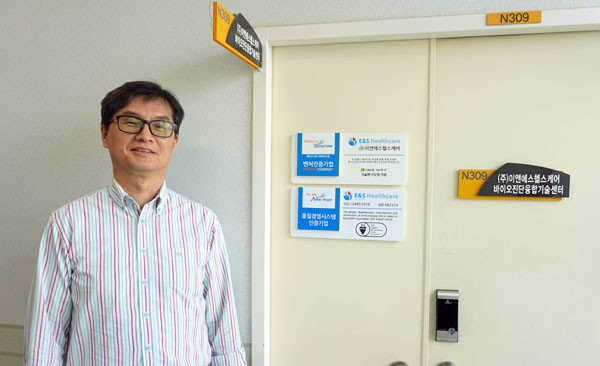기업
E&S Healthcare “Breast cancer diagnosis, Sensitivity · Specificity 90%↑”
by Jongwon Jang
Breast cancer screening diagnosis with active Trx1 marker corresponding to active oxygen... Clinical trial in domestic and overseas this year, advance into overseas market.

▲서경훈 이앤에스헬스케어 대표.
E&S Healthcare has developed a new diagnostic method for breast cancer that, as of now, does not have reliable diagnostic tests, other than mammography. This is the blood-based ELISA screening kit, ‘DxMe® BC’. It has a sensitivity and specificity of more than 95 %, and clinical trial will be initiated this year for approval in Korea.
E & S Healthcare utilizes the antioxidant protein Thioredoxin1 (Trx1) against reactive oxygen species as a biomarker, to diagnose breast cancer in the early phase. Thioredoxin (Trx) is an antioxidant protein that acts as an electron donor for the associated antioxidant system. It is involved in the growth of tumor cells by controlling the DNA binding activity of transcription factors, such as NF-kB, p53, glucocorticoid, and estrogen receptor. There are two types of Trx: Trx1 present in cytoplasm, and Trx2 present in mitochondria.
To investigate the role of Trx1 in breast cancer, the research team used tissue samples to observe the mRNA and protein levels of the target.
They measured the expression of Trx1 in 48 human organs, including bone marrow, brain, cervix, heart, lung, and breast tissue, and observed very low expression in normal breast tissue. Thereafter, the level of mRNA expression of Trx1 in breast cancer, colorectal cancer, kidney cancer, liver cancer, lung cancer, ovarian cancer, prostate cancer, and thyroid carcinoma tissues was the highest in breast cancer tissues. CEO Seo Kyung-hoon (Professor, Baejae University) said, “When comparing the expression levels of normal and breast cancer tissues, Trx1 showed a difference of more than 6 times.”
In order to clarify the relationship between these two antioxidants and the progression of breast cancer, the team checked the Trx1 expression in breast cancer tumor in phases 1–4. The expression of Trx1 was increased with the progression of the disease. It was also confirmed that the increase patterns of Trx1 coincided with each other. Seo explained, “Several experiments have shown that Trx1 is preferentially over-expressed in breast cancer tissues, and that their expression level is related to staging, confirming the potential of Trx1 as a breast cancer biomarker.”
This diagnostic kit has superior sensitivity and specificity compared to the existing products, such as CA15-3 and CEA, which are presently used for the prognosis of breast cancer. The results are also included in the BMC research note of 2018.2.13.
Seo said, “The detection of Trx1 in normal human blood revealed no significant difference according to sex and age. This is the result of meeting the basic requirements of the diagnostic kit. In addition, when the expression of Trx1 in normal human and breast cancer, kidney cancer, lung cancer, and rectal cancer was compared, it was found that the breast cancer tumor showed the greatest difference from the blood of normal person.”
The researchers then conducted an experiment to compare the ability of the existing biomarkers and Trx1 to screen patients for breast cancer diagnosis and prognosis. CA15-3 and CEA tumor markers were used as biomarkers for the diagnosis of breast cancer and prediction of therapeutic effect.
The researchers conducted a blood sample of 100 normal people and 100 breast cancer patients. The sensitivity of CA15-3 was only 48 %. In contrast, Trx1 showed a sensitivity of more than 96 %. Seo said, “When we performed the CA15-3 or CEA tumor marker tests, we correctly identified the false negative patients who were diagnosed as normal, even though they have breast cancer, as positive in Trx1 test. This means that patients who have not been diagnosed before can be more accurately screened.”
Seo added, “We measured the sensitivity and the specificity as (96.5 and 97.9) %, respectively, in an experiment conducted on about 300 normal and breast cancer patients.”
The benefits of DxMe® BC are the ability to consistently diagnose breast cancer, regardless of genotype, stage, or age. It was confirmed that patients were able to be selected evenly in test with samples of breast cancer patient by classifying them according to age, and were not affected by the physiological environment of women, such as menopause. Histologic stage and cell proliferation rate, as well as estrogen receptor, progesterone receptor, and HER2, could be diagnosed, regardless of different genotypes.
Seo CEO explained, “Our goal is to become a market leader through various in vitro diagnostic products, such as for ovarian cancer, general cancer, and prostate cancer, starting with breast cancer screening test. We also plan to actively seek overseas market entry.” E & S Healthcare has registered the trademark DxMe in the United States, which means “diagnose myself”.














![[인사]한미그룹 2026년 정기 임원인사](https://img.etoday.co.kr/crop/77/77/2071974.jpg)




